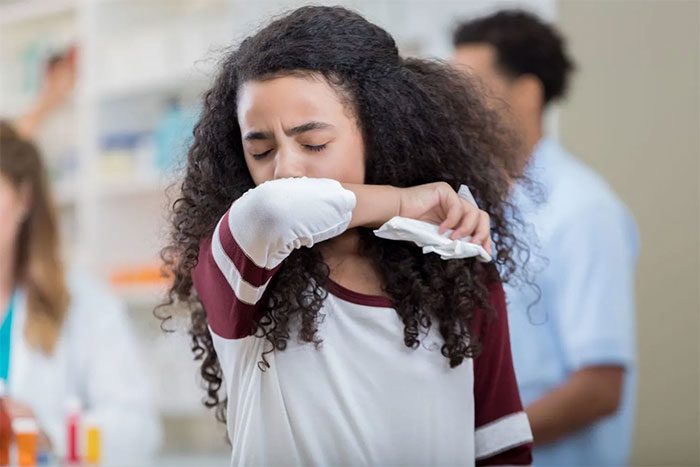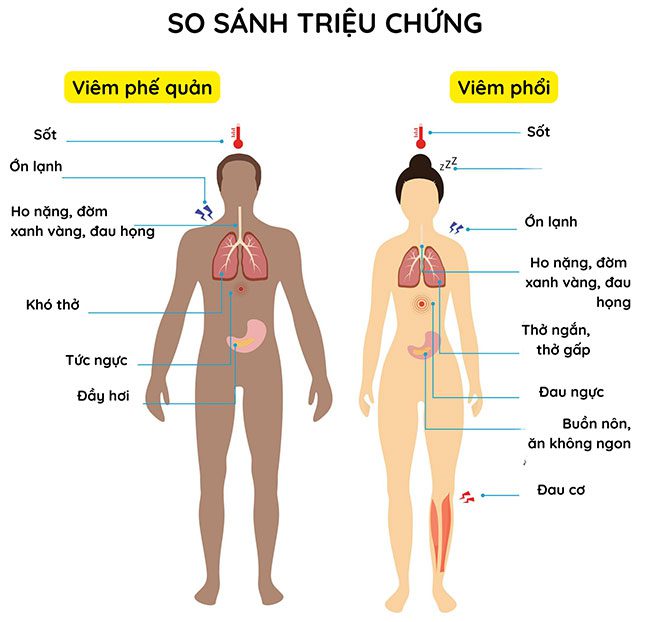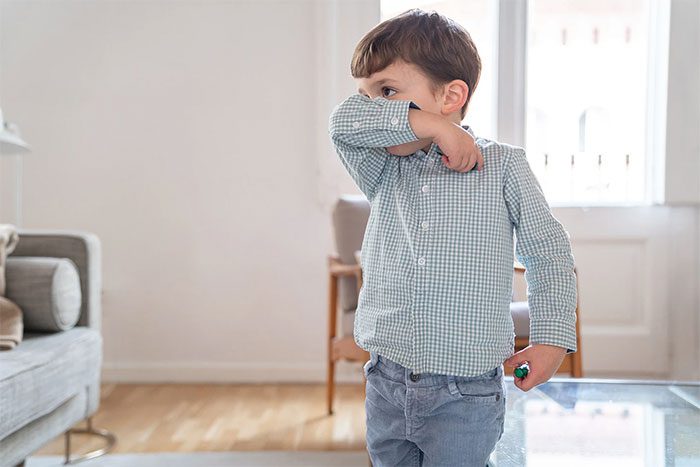As the cold season begins, children are frequently confronted with upper respiratory infections and lower respiratory infections, including bronchitis. Accurately recognizing the symptoms of bronchitis allows parents to intervene promptly for their children. So, does bronchitis come with a fever?
1. So, does bronchitis cause a fever?
According to VeryWell, if bronchitis is caused by an infection such as the common cold, respiratory syncytial virus (RSV), or influenza, then bronchitis can lead to a fever. And infectious bronchitis is referred to as acute bronchitis.
In cases of mild acute bronchitis, the patient may experience a low-grade fever below 37.9 degrees Celsius. In more severe cases of bronchitis, the fever can rise to nearly 39 degrees Celsius.
Acute bronchitis is an inflammatory condition resulting from infections like colds or flu. Acute bronchitis can cause fever. Chronic bronchitis is a long-term inflammatory condition, often caused by smoking. If you have chronic bronchitis, you will almost never experience a fever.
However, there are still cases of acute bronchitis without fever and chronic bronchitis with fever – thus, it is essential to monitor any unusual fever-related symptoms and consult a doctor as soon as possible.

Acute bronchitis typically causes fever. (Image: Internet).
2. Coping with bronchitis
Bronchitis can be a prolonged health condition, and symptoms from bronchitis can last for weeks. Meanwhile, symptoms of chronic bronchitis may last even longer. However, regarding fever, the fever usually subsides a few days after treatment begins.
2.1. Fever due to bronchitis
A fever is part of the body’s immune response, so experiencing a fever when the body encounters an infectious agent is entirely natural and even beneficial, indicating that the immune system is functioning properly, especially if bronchitis is due to a viral or bacterial infection.
The fever temperature when experiencing bronchitis typically ranges up to 39 degrees Celsius, depending on the severity of the case. If you have a fever due to bronchitis, you may also experience other accompanying symptoms such as body aches and chills.
In most cases, fevers associated with bronchitis can last for 3 to 5 days. Since bronchitis is often caused by a virus, using antibiotics usually has little effect on treating bronchitis.
Treating fever due to bronchitis
If experiencing a fever due to bronchitis, antipyretic medications can help the patient feel more comfortable, including alleviating related symptoms of body aches.

Reducing fever due to bronchitis in children and adults has some differences. (Image: Internet).
- Treating fever in adults: Adults with a fever due to bronchitis can take over-the-counter antipyretics such as Acetaminophen, Ibuprofen, Naproxen, and Aspirin. These medications not only reduce fever but also relieve pain and overall discomfort.
- Treating fever in children: Children with a fever due to bronchitis can use Acetaminophen or Ibuprofen to reduce fever. Note that children under 19 should not use Aspirin for fever reduction as it may increase the risk of Reye’s syndrome – a rare but dangerous condition.
When a patient has a fever, it is advisable to dress them in breathable clothing, and wiping the body with warm water can also help make the fever sufferer more comfortable.
Treating bronchitis usually includes other home remedies such as:
- Using a humidifier can help patients breathe easier when suffering from bronchitis. Warm and humid air helps thin mucus in the lungs and makes coughing easier.
- Drinking plenty of fluids helps prevent dehydration, reducing mucus buildup in the lungs and bronchi.
- Resting and getting enough sleep provides the body with the energy needed to fight the infection causing bronchitis.
2.2. Other symptoms
The main symptom of acute bronchitis and chronic bronchitis is a cough. The cough from bronchitis can be dry, wheezing, or productive with mucus.
Other signs of acute bronchitis may include: runny nose, sore throat, chest and sinus congestion, shortness of breath, and fatigue.
Symptoms of acute bronchitis in children may also include a mild fever; however, children can have bronchitis without a fever, accompanied by symptoms such as a runny nose, cough, and sore throat, along with vomiting, regurgitation, back pain, and a general feeling of unwellness.
Distinguishing bronchitis symptoms from pneumonia

Image: SKHN
3. When should you see a doctor?
Whenever you have a fever coupled with respiratory symptoms lasting several days or longer, you should see a doctor to rule out serious causes such as bacterial infections and to receive guidance on home remedies to alleviate symptoms.

Consult a doctor if symptoms worsen. (Image: Internet).
Respiratory symptoms accompanied by a fever of 38.3 degrees Celsius or higher require examination at a specialized medical facility. A high fever may indicate a bacterial infection and a secondary infection following a viral infection.
Additionally, other symptoms indicating the need for early consultation include:
- Coughing up green or yellow mucus
- The patient feels short of breath, chest pain
- The patient has existing lung conditions such as asthma or chronic obstructive pulmonary disease.
The information above answers the question of whether bronchitis causes a fever. If you experience a cough and fever that do not improve over several days, you should see a doctor for lung examination and any necessary instructions. Note that recovery from bronchitis or pneumonia can be a long process, including a cough that may last for months. Rest and relaxation are essential to speed up recovery.


















































